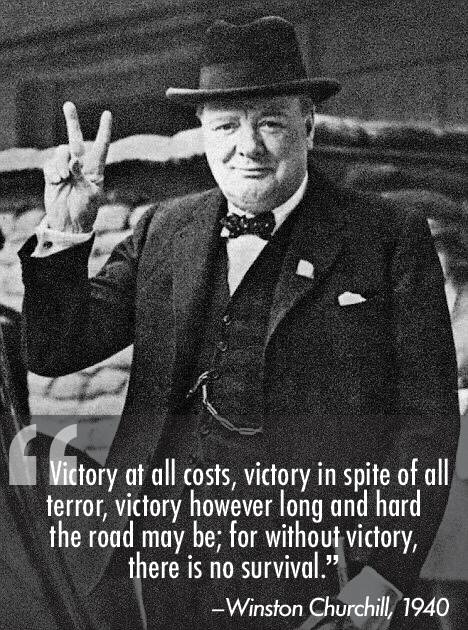
June 24, 2010
Originally posted at Hard Corps Wife.
The biggest news over the past few days has been the Rolling Stone article which featured comments made by General McChrystal that would lead to his resignation.
I haven’t commented yet because I’m still a little unsure what to think. The communication between the White House and McChrystal has been deplorable. McChrystal asked for 80,000 troops to win the war, and Obama sent him far less than that — and basically told the enemy when we would be leaving by establishing a timeline.
On the other hand, I don’t agree with the new ROEs McChrystal has been instituting in Afghanistan. I know, I’m just a lowly milspouse and I really have no clue what being at war is like. But I don’t like the idea of our troops hands being tied. We can’t gingerly go to war; we have to have the stomach to kill and to destroy. That is the nature of war. Our enemy is willing to do that, and if we take every precaution we can to avoid doing the same, then how can we possibly win? The fact of the matter is, the situation in Afghanistan has gotten worse, not better. I know that General McChrystal is brilliant. I don’t know that he’s the best person to win this war in Afghanistan. And this article doesn’t have any effect on that.
Now, do I agree with that McChrystal said about the Obama administration in the article? Absolutely. Is this how soldiers talk together? You betcha. It’s idiotic and naive to assume that this is some kind of anomaly. This is what it is like on the battlefield, this is what it is like if you around servicemembers. Just because they have to be respectful of their Commander-in-Chief, it doesn’t mean that they never criticize him. They’re just usually smart enough to only do so in private — and not to a freaking Rolling Stone reporter. I just don’t understand what on Earth McChrystal was thinking. Not only did he say these things to a reporter, but it wasn’t even a reporter from a friendly news organization. When has Rolling Stone — or any other leftist news organization — ever covered the war in a fair manner? They’ve all of them been against the United States fighting back from the very beginning. Oh, sure, they all blathered on about how Afghanistan was the “good” war, and they aren’t trying to undermine our efforts like they did in Iraq. Instead, they’re merely silent. McChrystal isn’t some PFC idiot who had no idea what he was getting into by talking to Rolling Stone, either. That’s what I just can’t get around. He knew better. Ridiculous as it may seem, he was insubordinate, and he was dumb enough to make these remarks to a reporter. He asked for it. You want to talk about how the Obama administration is screwing up your efforts in Afghanistan, you wait until the job is done and then you write a memoir or jump onto the talk show circuit. You don’t talk to a reporter while you’re still in charge. McChrystal knew that. Either he set himself up on purpose — maybe to drop a bigger bombshell in the coming weeks — or he screwed up big time. One or the other.
So now, we have Petraeus taking over command in Afghanistan, which is technically a demotion for him. Frankly, though, I’m glad. We’re in the same situation in Afghanistan as we were in not too long ago in Iraq — and Petraeus was able to turn it around and win. I have much more faith in him than I ever did in McChrystal.
There are three major issues that General Petraeus will be facing, and apparently, these are the actions he will take to confront them.
First, at the strategic level, Afghanistan can be stable only when Pakistan moves against the Taliban. The major technical problem is the 1,600-mile border with Pakistan that provides the Taliban and other terrorist groups with a sanctuary. The chairman of the Joint Chiefs, Adm. Mike Mullen, has cultivated a sound working relationship with the head of the Pakistani Army.
Elements of that army, however, want to maintain working relationships with the Taliban as a hedge. Meaning, if the U.S. abruptly withdraws and the Taliban take over, Pakistan wants to have some influence over a Taliban government in Kabul.
So Petraeus, along with other top officials, will be spending considerable time wooing Pakistan. If the Taliban do not feel squeezed, negotiations about reconciliation and power-sharing will be drawn out. As we saw four decades ago when Henry Kissinger negotiated with the North Vietnamese, reaching an agreement with an enemy that has not been defeated is perilous.
The second task Petraeus faces is at the operational level of war. He authored the Field Manual on Counterinsurgency, or COIN, that has become the textbook for waging this conflict. Its key premise was a two-sided social contract. On one side, we provide protection, projects and reasonably decent local administrators to support the civilian population; on the other side, the people reject the cause of the insurgents and point out the subversives.
However, so far the Pashtun tribes that gave rise to the Taliban movement have not bought into that contract. The Pashtuns have accepted projects, but rarely reciprocate by pointing out the Taliban hiding in plain sight among them or by urging their young men to join the government forces. This is the nub of the problem inside Afghanistan itself.
The third task awaiting Petraeus is at the tactical level. He must be very careful about the morale of his troops, who feel the rules of engagement have become too onerous. The worst outcome would be for our soldiers or Marines to avoid the hard areas because they felt they couldn’t fight aggressively.
It’s an incredibly complex, near-impossible balancing act: How much danger do our troops accept in order to avoid the risk of civilian casualties? Much of this is psychological and a matter of perception. Our soldiers need to know that the high command backs them up and is not judging them through constant investigations and second-guessing. More pressure must be placed on the enemy by killing and capturing insurgents.
That last part made me snort. Gee, our troops should be able to act aggressively without fear of investigations? We need to kill and capture more insurgents? Wow, who woulda thunk?
Meanwhile, MoveOn.org has scrubbed all vestiges of their despicable “General Betray Us” ad from their website. Unfortunately for them, Weasel Zippers still has screen shots.
I have to say, I actually feel more optimistic with Gen. Petraeus leading us in Afghanistan. I honestly do believe that if anyone can turn the mess in Afghanistan around, it’s Gen. Petraeus, and he’s apparently fired up and ready. What does worry me is what will happen a year from now, in July 2011, when our timeline is up. We won’t have victory in a year — let’s just be realistic. And Obama will be gearing up his reelection campaign. What will he do? His anti-war liberal base will want him to give up and pull out. Democrats are already starting to say that our policies are failing there. And of course, that means the only good action to take is not to change the failed policies, but to pull out of Afghanistan! Obama might listen to them. That will infuriate the rest of the country, of course, and could have potentially disastrous consequences for our national security. It will also mean that everything our troops have fought and died for will have been wasted. If Petraeus tells Obama that we need more time — as I believe he inevitably will — will Obama be willing to give it to him in the middle of campaign season? That’s the million dollar question.
Because, see, I have faith in our men and women in uniform. Regardless who is leading them, I know we can achieve victory if we’re willing to fight long enough for it. But, I wonder — will they be given the chance to succeed? They’ve got the skills, they’ve got a leader who is more than capable of leading them to victory. All they need now is an administration willing to back them up. Will they get it? Stay tuned.
I have seen reports that he deliberately did this because it would be the only way to force the administration to actually do something.
Take a look at this article on wizbang. He says that General McChrystal “fell on his sword” in order to force Obama to learn a lesson that had never faced before – loyalty is a two way street.
In brief, McChrystal found his loyalty (and that of the many, many honorable, decent, and valorous men and women under his command) was being taken for granted — and not reciprocated.
Constitutionally, that’s perfectly fine. The military must remain loyal to the civilian leadership, but there is no requirement that that leadership must reciprocate.
Practically speaking, though, loyalty demands to be a two-way street. A true leader understands that he or she owes loyalty in return to those who have given theirs. Faith must be returned, or that loyalty will weaken — or break.
McChrystal, I theorize, saw that the Obama administration needed an abject lesson in that principle — something that is ingrained in anyone who has ever been even a moderately successful leader or manager. (Obviously, that excludes the president, the vice-president, the Secretary of State, and a lot of others in the Obama regime.) So he engineered (or, at least, exploited) an opportunity to teach them.
The on-the-record disdain McChrystal uttered or tolerated among his closest staff was the sort that could not be tolerated. He did the one thing that an officer as high-ranking and prominent as he could — he openly showed his lack of respect to his superiors.
That put Obama in an untenable position. McChrystal’s conduct could not be ignored, could not be excused, could not be tolerated. It had to be answered, and answered firmly.
In brief, McChrystal put Obama in a position where he had no choice but to assert his authority as Commander In Chief, and remind all concerned that the supremacy of our civilian leadership is something that can not be questioned or challenged within our military.
McChrystal, first by allowing the reporting of those remarks and then by submitting his resignation, boxed in Obama to two simple choices. Either he had to refuse the resignation, granting him absolution with a very public “go and sin no more” gesture and a statement of profound contrition and gratitude from McChrystal for the second chance, or accept the resignation of his hand-picked “savior of Afghanistan” and find a new commander for the increasingly-difficult struggle.
The one option not open to Obama was the one to which he is most comfortable: to “vote present.” To do nothing. To step out, make a few grandiose, vague statements, and let the problem just go away. No, he had to take a decisive action in this matter, and be the Commander In Chief.
Yesterday, President Obama — for the first time in his administration — acted like the Commander In Chief he is — but has been in title only. He reminded the military that he is their Constitutional leader, and showed that no general — no matter how popular, no matter how he was Obama’s hand-picked for commander in Afghanistan — is free to reciprocate the contempt and disdain members of the Obama administration has shown them.
There was an even stronger lesson for Obama, one that I wonder if McChrystal planned as well. Obama’s choice of General David Petraeus to replace McChrystal in Afghanistan was, if possible, an even stronger lesson in loyalty to the Commander In Chief.

Tip Us!
Become a Victory Girl!


Follow Us On Twitter!


Recent Comments

Rovin’ Redhead

2 Comments